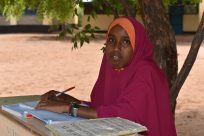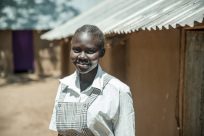Hungry for help: refugees in Kenya feel the effects of recent food cuts
KAKUMA REFUGEE CAMP, Kenya, January 9 (UNHCR) – Nyachot squints up at the midday sun above Kakuma Camp as she stirs the daily meal for her family. Before last November, the 34-year-old South Sudanese refugee could cook twice a day. But when the World Food Programme cut rations by 50 per cent that month, she feared for her children’s future.
“The food does not even last the two weeks that it should,” Nyachot told UNHCR visitors, turning to gaze at her baby son. Like thousands of other women at this camp in north-west Kenya, she relies completely on the rations she receives, in the absence of any other source of income. Full rations were later resumed on January 1, but the situation remains serious and fresh funding is needed to avert the risk of further cuts in the future.
Nyachot fled South Sudan in February last year, after fighting intensified between government forces and rebels. Desperate to save her children, she embarked upon an arduous weeklong journey that took her from her home in Maiwat, Upper Nile state to Nadapal, the border entry point to Kenya.
Her eyes filled with tears as she recalled the trauma. “I travelled by boat with about 40 other people for five long days to Juba and then took a bus from there to Nadapal,” she said. “My children were hungry and thirsty.”
When they finally arrived in Nadapal, UNHCR officials and other humanitarian agencies were there to greet them with energy biscuits and water. Later, at Kakuma’s reception centre, they received hot meals, sleeping bags and a place to sleep, before being transferred to Kakuma 4, the new settlement area for South Sudanese arrivals.
For Nyachot, finding refuge in Kakuma and receiving food assistance was a huge relief. Non-food items, such as blankets, cooking utensils, an energy stove and jerry cans, were also supplied and helped her family settle into their new home. But with the food ration cuts in November, Nyachot’s concern quickly began to grow.
In one of the nearby mud houses, Stephen and Gawar shared similar worries. They fled Pangak in South Sudan’s Jonglei state and, like Nyachot, sought refuge in Kakuma. “The situation is very bad,” observed Stephen, interviewed before full rations were resumed last week. “We eat once a day and the food can get finished after five days. Some of our people are even thinking of going back home. It is not an ideal solution, but people are desperate.”
Nyagai, their 36-year-old neighbour, concurred. “Once the rations run out, I survive by begging for food from my neighbours,” she says. “It is a shame to do so but what option do I have?”
Her friend, Nyapel, smiled sadly when she revealed that she could not breastfeed her 11-month-old son due to a medical condition. “I have to sell part of my meagre rations so as to buy milk for him. If I don’t this, then my son will not survive.”
After the ration cuts took effect in November, concerted efforts were made by World Food Programme to raise additional funding and restore full rations – and this was possible at the start of the month. But the funding situation remains uncertain and WFP and UNHCR have issued joint appeals to donors for help.
Meanwhile, UNHCR and partner NGOs continued to engage with refugees through their community leaders to assure them of continued support during November and December. These efforts were a result of the recent joint Inter-Agency Regional Appeal for the South Sudan Emergency Response.
Although refugees had been assured that this was a temporary situation, they remain concerned. “If the food cuts continue, many people will suffer, especially the elderly, the women and children,” said Gawar. Stephen believed that their hope lies with UNHCR.
As she turned back to her cooking, a glimmer of hope flickered in Nyachot’s eyes. She, at least, believed that things would get better; if not for her then at least for her children.
Page 8 of 18
-

Refugee girl achieves highest score in Dadaab camps
18 Dec 2018“Education is my only hope for a prosperous future and better life for my family.” says Maryan
-

Talent show in Kenya’s Kakuma refugee camp, lifts spirits and brings hope
11 Dec 2018Refugee talent brought to life in the 5th year of ‘Kakuma Got Talent’ competition.
-

South Sudanese Girl in Kakuma Shines in Kenya’s National Examination
10 Dec 2018She had scored 418 marks out of the possible 500 marks. The leading candidate in the country scored 453 marks.
-

Congolese tailor with disability stitches new life in Kenya
3 Dec 2018Hota Biclere is a refugee from the Democratic Republic of Congo (DRC). She has a spinal deformity which has resulted in a curved back. Despite being a refugee with a physical disability, Biclere has established a successful tailoring business where she is employing other refugees.
-

UNHCR senior officials visit Kakuma Refugee Camp and Kalobeyei Settlement to assess current support for refugees and host communities.
29 Nov 2018“There is a need to engage more with the private sector,” UNHCR’s Senior Advisor, Private Sector Partnerships, HRH Prince Jaime de Bourbon.
-

Kenyan Woman Gives Hope to Refugees and other Victims of Gender Based Violence
25 Nov 2018A prominent advocate for the empowerment of women, Mama Lul supports both Kenyan and refugee women and champions for an end to sexual exploitation and abuse
-

Cash Based Intervention: Giving Refugees Choices in Shelter Construction
19 Nov 2018“Cash based intervention is a game changer that gives refugees an opportunity to make their own choices”
-

Refugee Athletes Join Race for Peace
13 Nov 2018“I had to endure the pain of running for ten kilometers on hilly terrain to send a message that peace can also be promoted through sports”
-

Burundian refugee soap products meet Kenya national quality mark
30 Oct 2018“Getting the permit and endorsement of the Kenya Bureau of Standards has opened up more opportunities for my business as people now trust the quality of my products.”
-

Refugee Students at M-Pesa Foundation Academy hone their skills in entrepreneurship, leadership and sports
26 Oct 2018“MPESA Foundation Academy has excellent facilities and a superb philosophy of inclusion and respect for diversity.”
